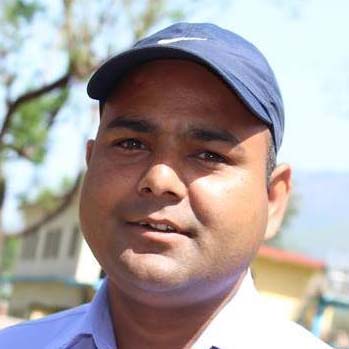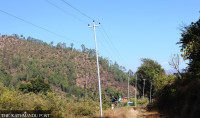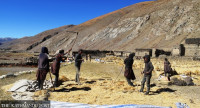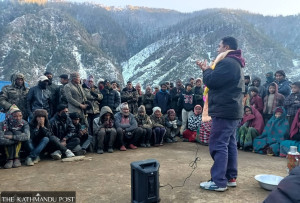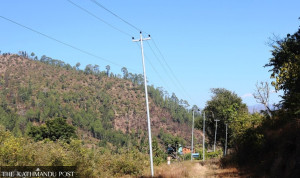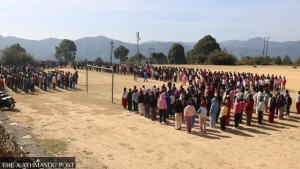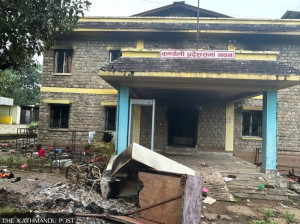Karnali Province
Grant delay leaves earthquake victims out in the cold
Distribution of housing grants remains stalled after data on losses submitted by local authorities in Jajarkot and West Rukum is found to be inaccurate.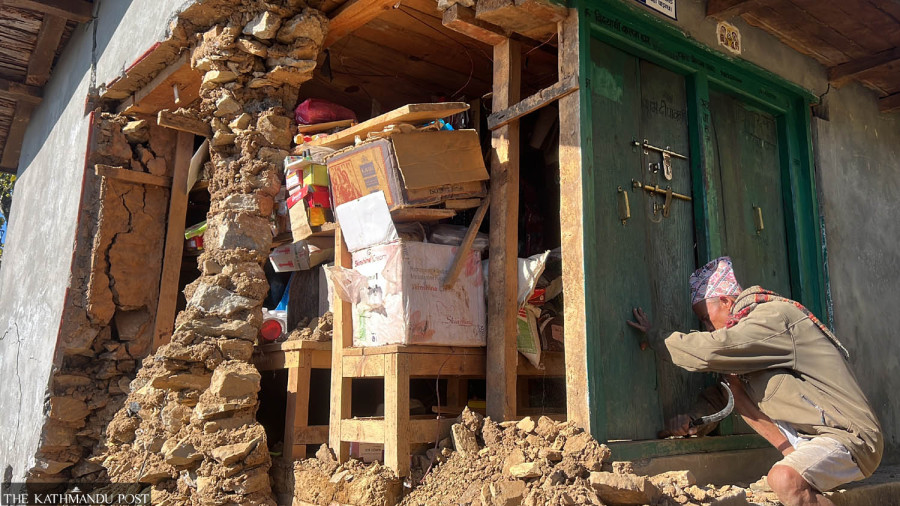
Krishna Prasad Gautam
Local authorities have restarted the data collection process and the headcount of survivors of the November 3 earthquake citing errors in the first attempt. Delays in finalising the data have deprived the displaced families of government grants meant for the construction of temporary housing.
Rangabir Rawat, a displaced victim from Rawatgaun in ward 1 of Bheri Municipality in Jajarkot, said that living under a tarpaulin tent for almost a month has taken a terrible toll on his family of six with four children. “The temperature is dipping by the day. It’s getting difficult to survive outside in the cold. If the municipal authorities had done a thorough job of collecting data and verifying actual victims the first time around, we would have been able to build temporary houses before the winter set in in earnest,” said Rawat.
The local authorities in both Jajarkot and Rukum West started the data collection and verification process three days after the earthquake.
The District Disaster Management Committees of both districts said they could not release the first instalment of the grant to build temporary shelters for the displaced since the data submitted by the disaster management committees in the affected local units was inaccurate and could not be verified.
According to Karnali Provincial Police, in the November 3 Jajarkot earthquake, some 34,501 houses were completely destroyed in Jajarkot while 16,909 houses were completely destroyed in Rukum West. So far, various political parties, organisations, and volunteers have only constructed about 350 temporary sheds in Jajarkot and 150 in West Rukum. A majority of the displaced are still living under tarpaulin tents.
“The grant money deposited by the government is still with the District Disaster Management Committees. The distribution of the first instalment has been halted due to discrepancies in data,” said Rajendra Bikram Shah, a local leader from Jajarkot. “The delay in the distribution of the grant has pushed the displaced into further hardships.”
According to the federal government, Rs50 million has been deposited into the bank account of the District Administration Office of Jajarkot and Rs50 million into the account of the Rukum West District Administration Office for the construction of temporary houses for the displaced.
According to the Temporary Housing Construction Grant Procedure for Earthquake Affected Households-2080, a displaced family whose house is completely or partially damaged and has become inhabitable will receive Rs50,000 each in two instalments—Rs 25,000 in the first instalment and Rs 25,000 in the second.
According to the District Administration Office in Rukum West, only Triveni Rural Municipality made no errors in data collection and therefore received the first instalment of the grant money while the other affected local units both in Rukum West and Jajarkot have restarted the data collection and verification process.
Triveni Rural Municipality has been granted Rs1.6 million for the displaced victims to build houses. The money was transferred to the account of the rural municipality on Tuesday.
Around 55,000 families were displaced in the two districts of Karnali Province, and among them, 51,000 families received relief materials such as tarps, blankets, and rice, according to the province police office.
Kali Bahadur BK from ward 1 of Barekot Rural Municipality, Jajarkot, the epicentre of the earthquake, says the local authorities only collected preliminary data such as the names of the survivors and the extent of damage caused to the houses. “They should have done a more extensive homework before submitting the report to the district authorities. Due to a lack of clarity in the data submitted by the rural municipality, we have been made to wait longer,” said BK. “It is going to snow soon. Everyone in my family is sick. I don’t know when I’ll be able to build a house to keep the family safe.”
Prawesh Baduwal, assistant chief district officer of Rukum West, said that in order for the beneficiaries to claim the grant money, they have to submit a self-declaration application, a police report and a recommendation from the disaster management committee of their respective local units. The supporting documents are to be submitted by the local authorities to the district authorities along with verified data.
“There were several errors in the documents submitted by the local units. There were repetitions of beneficiaries’ names, there were no details of the damage, and police reports were missing,” said Baduwal. “We have instructed the local units to redo the work and submit their applications again as soon as possible. The grant will be released once proper documents are received. This will prevent misuse of funds and ensure that the grant reaches bona fide beneficiaries.”
According to Chandra Prakash Gharti, mayor of Bheri Municipality, there were errors in the applications submitted by the municipality due to a lack of manpower at the time of the disaster and difficult topography.
“It was a chaotic time in the aftermath of the disaster. Those involved in data collection and verification could not do their jobs properly,” said Gharti. “Everyone started giving their own versions of the losses incurred leading to more confusion. We are now doing a recount and collecting the details again.”
Harishchandra Sharma, assistant chief district officer of Jajarkot, said that they have also instructed the affected local units to redo the count and recollect the details.
“We estimate that it will take around six days to collect the data again. Once the local units submit their applications, we will start distributing the money,” said Sharma.
Meanwhile, three earthquake-displaced people died of cold in Rukum West in the last three days. According to the locals, two people aged 62 and 64 years from ward 14 of Athbiskot Municipality and another man aged 75 from ward 11 of the same municipality died of health complications while living under tarpaulin tents. “The 62-year-old woman died on Tuesday while the 64-year-old man who was an asthma patient died on Sunday night,” said Gopal KC, a local man. “The 75-year-old man was also suffering from asthma and abdominal ailment. He died on Monday. All of them were living under tarpaulin tents with the rest of the displaced since the earthquake hit.”
At least 11 people have died of cold-related issues in Jajarkot. The local health posts have been reporting an increase in patients suffering from cold-related health issues in temporary tents. “The number of patients visiting the health post has soared lately. Senior citizens, children and new mothers have been greatly affected by the displacement," Dev Bahadur Chand, chief of the Ghetma Health Post at ward 14 of Athbiskot, told the Post. “Several senior citizens are suffering from respiratory illnesses. They shouldn’t be made to live under tarpaulin tents a day longer.”
(Mahesh KC contributed reporting from Rukum West)




 10.12°C Kathmandu
10.12°C Kathmandu